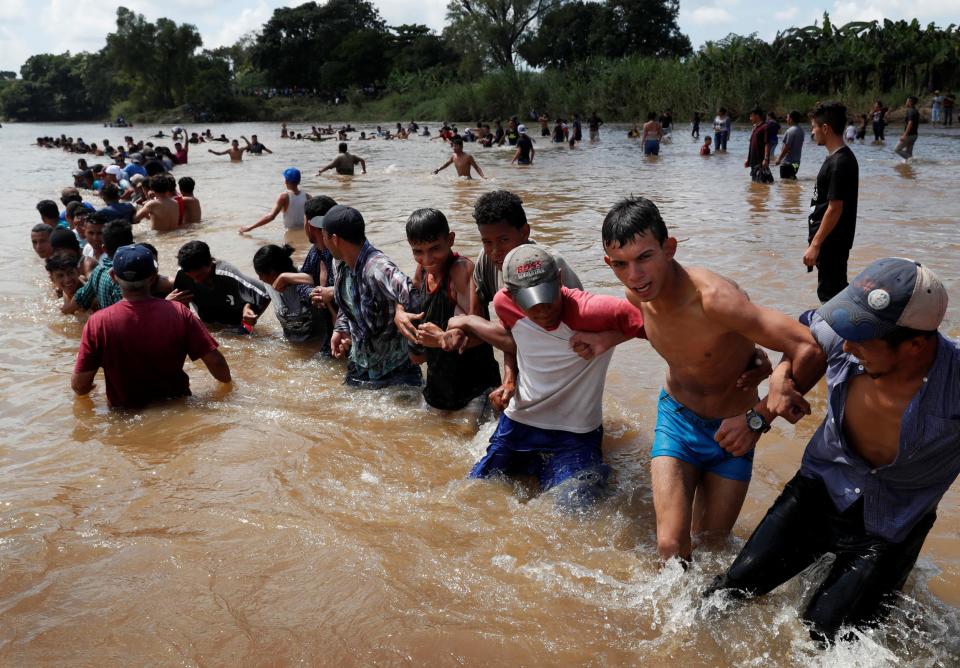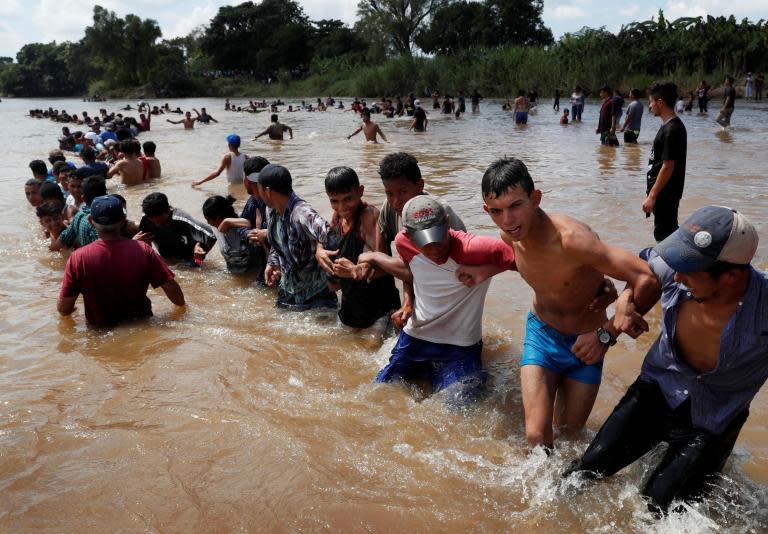Don’t be fooled by Trump’s caravan rhetoric – it’s much more profitable to incarcerate migrants than to stop them at the border
There’s a saying in Spanish, “Don’t give me anything; just put me where there’s something.” Under the current administration, the private immigration detention industry is certainly the place to be if you’re looking to make serious dividends.
While Trump distracts the American public with his inflammatory words about the migrant caravan making its way to the US-Mexican border ahead of the midterm elections next week, government contracted immigration detention centres have been trying to hold immigrant children far longer than the 20 days they are legally allowed under the 1997 Flores settlement and the government is working to detain them with their parents, indefinitely.
The multibillion dollar private immigration detention industry has boomed under the current government’s far-reaching detention policies, headed up by Attorney General Jeff Sessions. Under Trump arrests of undocumented immigrants with no criminal record have tripled.
And while the public discourse may make it seem like the current administration wants to keep the thousands of people that now make up the migrant caravans from Honduras out of the country, that’s not likely to be the case. Instead, it would make sense for the government to want these people to reach US territory in order to be able to detain them. Why? Because there’s a lot of money in immigration detention. So much money, in fact, that Canadian pension funds are increasing their investments in the two largest US private detention corporations, CoreCivic, Inc. and GEO Group, Inc., because of pay-outs that are expected to continue to rise under the current government’s immigration policy.
In 2018, when Trump announced his executive order that families would be detained together instead of being separated under the administration’s so-called “zero tolerance policy”, shares for Core Civic and GEO Group jumped. The policy change didn’t come because of the global outcry at the cold-blooded inhumanity of ripping children away from parents and detaining them like criminals, it was because of money: detaining families together meant immigrants would likely spend more time in detention while their claims were processed and detention centres would require additional services for children. Think of it like a hotel booking: extending your stay and requesting more amenities comes at a higher price, which means higher profits for the private prison industry; profits paid for by US taxpayers who are told their borders will be safer with these prohibitively costly, arguably unnecessary and undoubtedly inhumane measures in place.
Immigration and Customs Enforcement (ICE), the agency tasked with enforcing immigration policy, is required by law to maintain 34,000 immigration detention beds, daily. At between $119-159 dollars per day, per person, that adds up to approximately $5.5 million dollars a day and over $2bn a year. Last year, Immigration and Customs Enforcement (ICE) spent nearly $3bn dollars to manage the immigration detention system. For the fiscal year 2018, ICE has requested one billion more from congress. CoreCivic, Inc. and GEO Group, Inc. made more than $4 billion combined in 2017. Not all of that money came from immigration detention – but it is a significant portion of their business.
Alternatives to detention (ATD) for immigrants who do not pose a threat to US society could save American taxpayers up to 80 percent of the annual costs of private immigration detention. But these corporations have spent millions lobbying the president and congress to make sure that the government doesn’t invest in more efficient, effective and humane ATD measures like home visits or ankle bracelets. Trump alone received $250,000 each from GEO Group and CoreCivic in 2017, and has no reason to believe the contributions will stop as long as his administration continues with the current policy and US congress members continue to earmark funding for the industry.
The Trump administration didn’t create the private immigration detention industry: it has been on the rise since the 1980s with the Reagan Administration’s “War on Drugs”. Obama deported more than two million immigrants over his two terms – more than any other president in US history. In the last two years of the Obama administration the government shifted its focus to criminals and other high-priority persons, and immigration detention numbers went down, a bit. To be sure, Obama’s immigration policy was bad – but it wasn’t this bad. Obama also didn’t refer to immigrants “rapists, drug dealers, gang members, and Middle Easterners” – which made his policy less offensive, at least on the surface.
Some critics may point out that the current administration’s deals with the private detention facilities are no better than the Bush administration’s ties to Blackwater during the Iraq war; I wholeheartedly agree. Perhaps it just feels dirtier because we are throwing children and families in cages like animals, but this time it’s in our own backyard next to suburban shopping malls and public schools, as the international community looks on in astonishment and disgust.
Trump’s dog and pony show is all about turning the migrant caravan away at the border, even though they have a legal right under US and international law to apply for refugee status from another country (Mexico), or reach a US port of entry and apply for asylum. But in reality it’s much more likely that they will simply lock them up.
America’s treatment of immigrants under this administration is something that will never be forgotten and cannot be forgiven. Let’s hope that US citizens never have to ask for refuge or asylum in a country that holds against us the current administration’s barbaric policy of for-profit nationalism.

